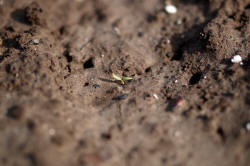|
The
market downturn has prompted Europe's biggest sugar refiner
Suedzucker to announce the closure of several factories by 2020,
which could lead farmers in affected zones to make further cuts
to beet planting next year.
This year's expected decline in planting should curb EU
production and help to turn a global sugar surplus that has been
pressuring prices into a net deficit, analysts say.
"The depressed markets after the end of the quotas has forced
farmers to adapt," said Timothe Masson, economist at the French
sugar beet growers group CGB, pegging a fall in plantings at EU
level at about 5 percent.
Assuming an average sugar yield, EU sugar production in 2019/20
would fall to about 18 million tonnes, Masson said.
That would be down 3 million tonnes from output in 2017/18, the
first season after the end of quotas, and stable versus the
current 2018/19 season, when harvests were hit by drought.
EU sugar output could be reduced by a further 700,000 tonnes by
aphid attacks, with many farmers in the bloc no longer allowed
to use neonicotinoid pesticides because of concerns they are
harmful to bees, Masson added.
In France, the EU's largest beet grower which has forbidden
these crop chemicals, the area drop could reach 8 percent
compared to last year, he said.
As of last week, French farmers had sown about 1 percent of
445,000 hectares expected in 2019, Masson said.
Frequent showers this month have slowed early sugar beet
planting, contrasting with rapid spring barley sowing in
February during a warm, dry spell.
In Germany, chilly conditions were holding up planting.
Most farmers are waiting for an improvement in the current cool
and cold weather before starting sowing, said Guenter Tissen,
CEO of German sugar industry association WVZ.
Beet cultivation in Germany was under pressure from unequal
competition within the EU, with some countries paying premiums
and some still permitting use of neonicotinoids, unlike Germany,
he said, adding that it was too early to give area forecasts.
In the UK, the crop area for the 2019/20 season is expected to
be between 5 percent and 10 percent lower than this year,
Associated British Foods said in its latest update last month.
(Reporting by Sybille de La Hamaide in Paris, Michael Hamburg in
Hamburg and Nigel Hunt in London; Editing by David Goodman)
[© 2019 Thomson Reuters. All rights
reserved.] Copyright 2019 Reuters. All rights reserved. This material may not be published,
broadcast, rewritten or redistributed.
Thompson Reuters is solely responsible for this content.

|
|





